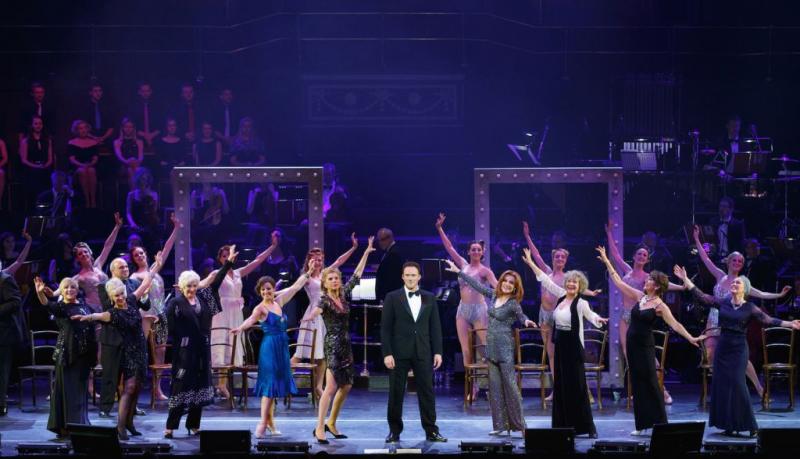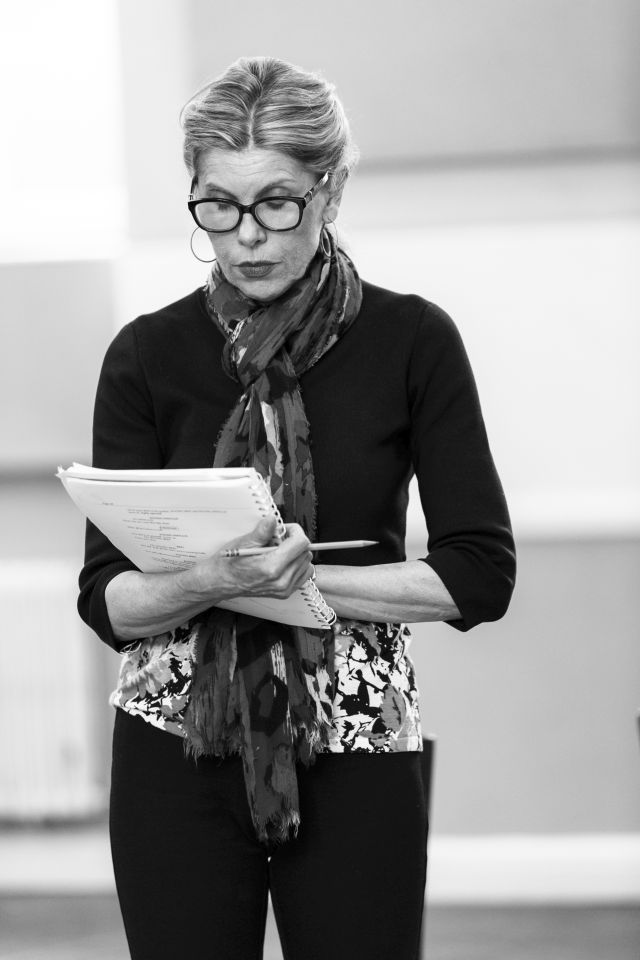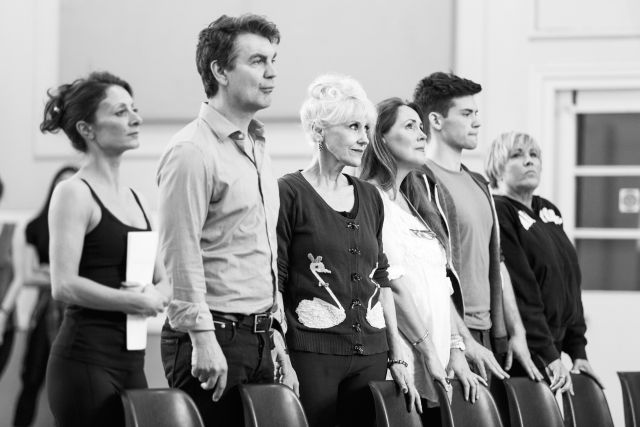Follies, Royal Albert Hall | reviews, news & interviews
Follies, Royal Albert Hall
Follies, Royal Albert Hall
Christine Baranski elevates latest Sondheim gala

God love Christine Baranski: Eight years after the Tony and Emmy-winning actress played the supporting role of Carlotta Campion in a semi-staged 2007 production of Stephen Sondheim's Follies in New York, along came the leggy, eternally lithe performer in the same musical, once again in concert form but this time upgraded to a starring role.
One intends a hard-working cast no discredit whatsoever in stating that, from this corner at least, Tuesday afternoon's Follies belonged largely to Baranski, or let's just say that she lifted Craig Revel Horwood's sometimes eccentric take on proceedings with every authoritative step. So what if she didn't quite match up in age with her first-rate Ben (Alexander Hanson, in terrific voice on what also happened to his birthday, as we learned during the curtain call)? The celebrated 1985 Follies in Concert with the New York Philharmonic – the bellwether by which all such events will be forever judged – had a Buddy and Sally in Mandy Patinkin and Barbara Cook who are a quarter-century apart in age and it made no difference.
What one-offs (or, okay, two-offs) such as the Albert Hall celebration make possible is the chance to see the best possible performer in that role, and Baranski from her first glittering entrance suggested that she could give the lingering memory of the role's Tony-winning originator, Alexis Smith, a serious run for her money.
 One expected her to nail the comedy of the part, which she did, finding the mordant humour in this swellegant society wife whose life choices are thrown into bold relief upon the occasion of the coming together of former showgirls that forms the Sondheim/James Goldman collaboration's slender plot. A take-charge cougar clearly used to treating men as prey, this was a Phyllis who suffered neither fools nor defeat gladly and whose need to play boss extended after the interval to her grabbing conductor Gareth Valentine's baton so as to commandeer Sondheim's score for a phrase or two of her eleventh-hour showstopper, "The Story of Lucy and Jessie". (Baranski pictured during rehearsals, above).
One expected her to nail the comedy of the part, which she did, finding the mordant humour in this swellegant society wife whose life choices are thrown into bold relief upon the occasion of the coming together of former showgirls that forms the Sondheim/James Goldman collaboration's slender plot. A take-charge cougar clearly used to treating men as prey, this was a Phyllis who suffered neither fools nor defeat gladly and whose need to play boss extended after the interval to her grabbing conductor Gareth Valentine's baton so as to commandeer Sondheim's score for a phrase or two of her eleventh-hour showstopper, "The Story of Lucy and Jessie". (Baranski pictured during rehearsals, above).
Away from the spotlight, one also glimpsed a savvy anatomist of the death-in-life that the material so pointedly describes. Her Phyllis would live to see another day - something that one can't necessarily say, by contrast, of the less resilient Sally - but not without an ongoing awareness of the hole where her heart once was. As the most prominent of an array of American visitors to the Albert Hall stage that included London semi-regulars Betty Buckley and Lorna Luft, Baranski raised the bar for a company that turned out to be more accomplished in performance than one might necessarily have assumed they would be on paper.
As the feckless Buddy, for instance, Peter Polycarpou seemed to have recovered the vocal prowess distressingly absent from his press night performance last December in the Donmar revival of City of Angels, and both he and Ruthie Henshall, as Buddy's ever-lovesick wife Sally, brought to their parts a residual anger as if to give credence to Buddy's throwaway remark early on that Sally likes to phone her two errant sons not least so she can fight with them. Indeed, Henshall's climactic "Losing My Mind" may not have featured the airborne high notes that this most rending of torch songs can allow, but the actress (on loan from her ongoing West End stand in Billy Elliot) more than compensated with an unexpected and finely felt fury. Here was a Sally none too happy to have been pushed to the emotional limit and beyond.
Elsewhere, Follies proceeds via a superabundance of star turns from the guests at Dimitri Weismann's gathering of ageing follies performers inside a theatre marked for demolition – the space, like many of the lives to which it is playing host, on the verge of collapse. An initially low-key matinee audience began to warm up once a tap-happy Anita Dobson (pictured centre below, with Hanson to her right) led the ladies in "Who's That Woman?", though one wished that Andrew Wright's choreography on that occasion hadn't sidelined the senior generation quite so much. And an arm-waving Buckley plowed gamely into "I'm Still Here" (the song previously delivered by Baranski in New York), not so much inflecting some of Sondheim's most delicious lyrics – "then someone's mother / then you're camp" – as roaring her way through them.
 The early mash-up of "Rain on the Roof", "Ah Paris!" and "Broadway Baby" is tricky at the best of times and had the cacophonous effect here of reducing the Anita Harris/Roy Hudd double-act to an afterthought, and the interval was placed so late that for a while I thought there wasn't going to be one, which is a choice some directors have taken in the past. As it was, the second act consisted pretty much exclusively of the "Loveland" sequence in which the ageing quartet's younger selves come into their own, special mention due this time round to Jos Slovick's Young Buddy, whose very-sweet "soul-stirring" (sung to his newly beloved Sally, decades before the disappointment and deception that would come to define their marriage) was precisely that.
The early mash-up of "Rain on the Roof", "Ah Paris!" and "Broadway Baby" is tricky at the best of times and had the cacophonous effect here of reducing the Anita Harris/Roy Hudd double-act to an afterthought, and the interval was placed so late that for a while I thought there wasn't going to be one, which is a choice some directors have taken in the past. As it was, the second act consisted pretty much exclusively of the "Loveland" sequence in which the ageing quartet's younger selves come into their own, special mention due this time round to Jos Slovick's Young Buddy, whose very-sweet "soul-stirring" (sung to his newly beloved Sally, decades before the disappointment and deception that would come to define their marriage) was precisely that.
And Valentine's orchestra – those strings! that brass! – was at its swoony best accompanying Charlotte Page (wife of Alistair McGowan, the concert's somewhat perfunctory Weismann) on the heavenly "One More Kiss", the operetta-style paean to the evanescence of romance whose lyric "all that's beautiful must die" is contradicted every time Follies is staged afresh. At such moments, this show's eternally baleful beauty lives anew.
Add comment
The future of Arts Journalism
You can stop theartsdesk.com closing!
We urgently need financing to survive. Our fundraising drive has thus far raised £49,000 but we need to reach £100,000 or we will be forced to close. Please contribute here: https://gofund.me/c3f6033d
And if you can forward this information to anyone who might assist, we’d be grateful.

Subscribe to theartsdesk.com
Thank you for continuing to read our work on theartsdesk.com. For unlimited access to every article in its entirety, including our archive of more than 15,000 pieces, we're asking for £5 per month or £40 per year. We feel it's a very good deal, and hope you do too.
To take a subscription now simply click here.
And if you're looking for that extra gift for a friend or family member, why not treat them to a theartsdesk.com gift subscription?
more Theatre
 Othello, Theatre Royal, Haymarket review - a surprising mix of stateliness and ironic humour
David Harewood and Toby Jones at odds
Othello, Theatre Royal, Haymarket review - a surprising mix of stateliness and ironic humour
David Harewood and Toby Jones at odds
 Macbeth, RSC, Stratford review - Glaswegian gangs and ghoulies prove gripping
Sam Heughan's Macbeth cannot quite find a home in a mobster pub
Macbeth, RSC, Stratford review - Glaswegian gangs and ghoulies prove gripping
Sam Heughan's Macbeth cannot quite find a home in a mobster pub
 The Line of Beauty, Almeida Theatre review - the 80s revisited in theatrically ravishing form
Alan Hollinghurst novel is cunningly filleted, very finely acted
The Line of Beauty, Almeida Theatre review - the 80s revisited in theatrically ravishing form
Alan Hollinghurst novel is cunningly filleted, very finely acted
 Wendy & Peter Pan, Barbican Theatre review - mixed bag of panto and comic play, turned up to 11
The RSC adaptation is aimed at children, though all will thrill to its spectacle
Wendy & Peter Pan, Barbican Theatre review - mixed bag of panto and comic play, turned up to 11
The RSC adaptation is aimed at children, though all will thrill to its spectacle
 Hedda, Orange Tree Theatre review - a monument reimagined, perhaps even improved
Scandinavian masterpiece transplanted into a London reeling from the ravages of war
Hedda, Orange Tree Theatre review - a monument reimagined, perhaps even improved
Scandinavian masterpiece transplanted into a London reeling from the ravages of war
 The Assembled Parties, Hampstead review - a rarity, a well-made play delivered straight
Witty but poignant tribute to the strength of family ties as all around disintegrates
The Assembled Parties, Hampstead review - a rarity, a well-made play delivered straight
Witty but poignant tribute to the strength of family ties as all around disintegrates
 Mary Page Marlowe, Old Vic review - a starry portrait of a splintered life
Tracy Letts's Off Broadway play makes a shimmeringly powerful London debut
Mary Page Marlowe, Old Vic review - a starry portrait of a splintered life
Tracy Letts's Off Broadway play makes a shimmeringly powerful London debut
 Little Brother, Soho Theatre review - light, bright but emotionally true
This Verity Bargate Award-winning dramedy is entertaining as well as thought provoking
Little Brother, Soho Theatre review - light, bright but emotionally true
This Verity Bargate Award-winning dramedy is entertaining as well as thought provoking
 The Unbelievers, Royal Court Theatre - grimly compelling, powerfully performed
Nick Payne's new play is amongst his best
The Unbelievers, Royal Court Theatre - grimly compelling, powerfully performed
Nick Payne's new play is amongst his best
 The Maids, Donmar Warehouse review - vibrant cast lost in a spectacular-looking fever dream
Kip Williams revises Genet, with little gained in the update except eye-popping visuals
The Maids, Donmar Warehouse review - vibrant cast lost in a spectacular-looking fever dream
Kip Williams revises Genet, with little gained in the update except eye-popping visuals
 Ragdoll, Jermyn Street Theatre review - compelling and emotionally truthful
Katherine Moar returns with a Patty Hearst-inspired follow up to her debut hit 'Farm Hall'
Ragdoll, Jermyn Street Theatre review - compelling and emotionally truthful
Katherine Moar returns with a Patty Hearst-inspired follow up to her debut hit 'Farm Hall'
 Troilus and Cressida, Globe Theatre review - a 'problem play' with added problems
Raucous and carnivalesque, but also ugly and incomprehensible
Troilus and Cressida, Globe Theatre review - a 'problem play' with added problems
Raucous and carnivalesque, but also ugly and incomprehensible

Comments
I was there for the matinee,
Does anyone know if this
I really enjoyed the starfest
I was also near the stage and